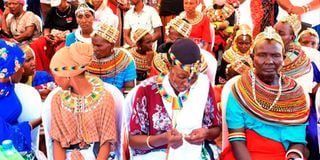Premium
We could do more to celebrate women in the marginalised counties

Women make bead products during International Women's Day celebrations at St George Catholic Church grounds in Laisamis, Marsabit on March 8, 2021.
What you need to know:
- The ratio of girls’ enrolments in schools have improved.
- The two thirds gender principle is still elusive, decade into the promulgation of the New Constitution.
March is a month to celebrate women’s achievements. Global events peak on March 8, on the International Women’s Day, as marked in the United Nations calendar.
It is also a month that the world takes the queue to call out the injustices women face in their journey to equality, socioeconomic and political justices.
From the 1995’s Beijing World Conference on Women, which birthed the infamous declaration and platform for action; to the litany of localised legislations that seek to promote and accelerate women’s equality agenda, women still face huge obstacles. In Kenya, the inequality gap is still awfully visible.
But to play blind to the strides covered so far would be malicious. There are pieces of success to run with. I chose to celebrate them. The ratio of girls’ enrolments in schools have improved. Equally, a handful women have been elected or appointed to positions of leadership.
However, I dare say, the momentum to striking the ideal gender parity and balance is very slow. We have remained stuck as a nation, in the politics of gender supremacy where the political elites have perfected the musical chairs game, to sustain the toxic male dominance. The two thirds gender principle is still elusive, decade into the promulgation of the New Constitution.
But worst caught in this sluggish mix are the counties in the northern frontiers; especially Turkana and Marsabit. The one shoe fits all strategy is not effective especially in the context of women and girls’ needs in the counties.
A Turkana or Borana woman is greatly challenged. And I don’t mean that women in other counties are living a great life. My proposition is only guided by the existing data on women’s quality of life and performance across the country, which you and I would agree falls short of what quality should look like, considering International standards.
Blanket statements such as increased enrollment in schools, increased number of women in political leadership positions are mere pale impressions in the northern counties. Turkana County, for instance, had their first ever woman elected representative, the Lake Zone Ward MCA in the 2017 General Election.
But even with this feat, the ward representative faces several challenges. She can neither speak English nor Kiswahili, the official languages used to conduct business in the county assembly. Why we cannot permit the use of local dialects in conducting House business, is food for thought. However, even with such a high level barrier, she charges on to make a difference.
Inequalities
The experience cuts across other frontier counties that grapple with such monumental inequalities. Which has got me thinking of some ways that would help positively influence the women and girls’ equality agenda in these special counties.
Firstly, the political landscape in Turkana and Marsabit, with largely the most disenfranchised women population, bears disproportionate effects of misrepresentation amongst women. During political parties nomination for instance, women often get a few nomination slots. The high party ticket fees, to a Turkana or Samburu woman means just one thing, she will not get near to the representation seat despite her popularity.
Can’t political parties lower these rates for women and institutionalise it as part of their equity principle?
Secondly, girls’ education is the greatest thing after “water”, in the northern counties. Education is the greatest life’s equaliser.
Would a suggestion to Members of Parliament, women reps, and Members of County Assemblies to increase girls' educational allocations in the kitties such as bursaries be asking for too much?"
And the gesture can be extended to other functions targeting women and girls. It takes political goodwill and intervention to correct what would have been the ideal society, where men and women all enjoy the spoils of the socioeconomic and political governance in counties they play part in.
Reproductive health
I know most counties have great reproductive health policies targeting young women and girls, including the northern frontier counties of Turkana and Marsabit. Though quite romanticised, I believe great stuff can be borne out of these policy documents if implemented to the letter.
Counties should start by dispensing and making available essentials such as sanitary towels in all social spaces just like they do with condoms in the fight against HIV/Aids.
Non-Governmental Organisations and the government should continue funding initiatives associated with pandemics. Girls skipping school sessions every month, engaging in transactional sex to fund basic sanitary towels is a pandemic.
Finally, nomination to political leadership offices, which I have always shunned as a poor concept to bridge an unequal political representation, but applied as a stopgap measure in our skewed local political systems, is great to that extent.
But I believe genuine nomination that identifies ability and talent to bring change and proper leadership at the various political institutions will help women improve their conditions.
Cosmetic endeavours that only engage “flower girls” to be seen to have filled positions will only continue to lower women’s leadership standards in these counties. I dare to say, nothing will be achieved in such a sham exercise.
Political interest
Much as these are political interest based appointments, these counties must have women’s interests by delivering productive nominations that would be value for money.
I’m hopeful that the gallant women of the margins will be celebrated better come 2022 and beyond. Happy month of March to all Kenyan women and girls.





